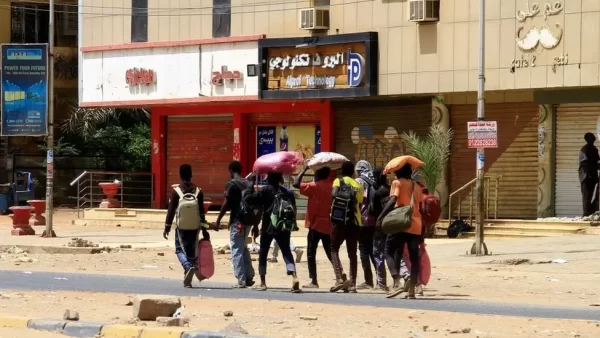It all revolves around infighting between two rival groups: the Sudanese army and a paramilitary group known as the RSF, or Rapid Support Forces. What’s behind latest fighting in Sudan?
Since a coup in the country in 2021, which ended a transitional government put in place after the fall of longtime dictator Omar al-Bashir two years earlier, Sudan has been run by the army, with coup leader General Abdel-Fattah Burhan as de facto ruler.
The RSF, led by General Mohammed Hamdan Dagalo who is generally known by the name Hemedti has worked alongside the Sudanese army to help keep the military in power.
Following Bashir’s ouster, the political transition was supposed to result in elections by the end of 2023, with Burhan promising a transition to civilian rule. But it appears that neither Burhan nor Dagalo has any intention of relinquishing power.
Moreover, they are locked in a power struggle that turned violent on April 15, 2023. Since then, members of the RSF and the Sudanese army have engaged in gunfights in the capital, Khartoum, as well as elsewhere in the country. Over the course of three days, the violence has spiraled.
The recent background to the violence was a disagreement over how RSF paramilitaries should be incorporated into the Sudanese army. Tensions boiled over after the RSF started deploying members around the country and in Khartoum without the expressed permission of the army.
But in reality, the violence has been brewing for a while in Sudan, with concern over the RSF seeking to control more of the country’s economic assets, notably its gold mines. The developments in Sudan over the last few days are not good for the stability of the nation or its prospects for any transition to democratic rule.
Who are the two men at the center of the dispute?
Dagalo rose to power within the RSF beginning in the early 2000s when he was at the head of the militia known as Janjaweed a group responsible for human right atrocities in the Darfur region. What’s behind latest fighting in Sudan?
While then-Sudanese President Bashir was the face of the violence against people in Darfur and was later indicted on crimes against humanity by the International Criminal Court the Janjaweed is also held responsible by the ICC for alleged acts of genocide. While they were doing so, Dagalo was rising up the ranks.
As head of the RSF, Dagalo has faced accusations of overseeing the bloody crackdown of pro-democracy activists, including the massacre of 120 protesters in 2019.
The actions of Burhan, similarly, have seen the military leader heavily criticized by human rights groups. As the head of the army in power and the country’s de facto head of government for the last two years, he oversaw a crackdown of pro-democracy activists.
One can certainly interpret both men to be obstacles to any chance of Sudan transitioning to civilian democracy. But this is first and foremost a personal power struggle.
To use an African proverb, “When the elephants fight, it is the grass that gets trampled.”
This cannot be framed as a left-wing versus right-wing thing, or about warring political parties. Nor is this a geo-religious conflict pitting a majority Muslim North against a Christian South.
And it isn’t racialized violence in the same way that the Darfur conflict was, with the self-identified Arab Janajaweed killing Black people. Some observers are interpreting what is happening in Sudan correctly, as a battle between two men who are desperate not to be ejected from the corridors of power by means of a transition to an elected government.
Is there a danger the violence will escalate?
A coalition of civilian groups in the country has called for an immediate halt to the violence as has the U.S. and other international observers. But with both factions dug in, that seems unlikely. Similarly, the prospect of free and fair elections in Sudan seems some ways off. What’s behind latest fighting in Sudan?
There doesn’t appears to be an easy route to a short-term solution, and what makes it tougher is that you have two powerful men, both with a military at their disposal, fighting each other for power that neither seem prepared to relinquish.
The concern is that the fighting might escalate and destabilize the region, jeopardizing Sudan’s relations with its neighbors. Chad, which borders Sudan to the west, has already closed its border with Sudan.
Meanwhile, a couple of Egyptian soldiers were captured in northern Sudan while violence was happening in Khartoum. Ethiopia, Sudan’s neighbor to the east, is still reeling from a two-year war in the Tigray region.
The spread of unrest in Sudan will be a concern to those watching an uneasy peace deal in South Sudan which gained independence from Sudan in 2011 and has been beset by ethnic fighting ever since. As such, the stakes in the current unrest could go beyond the immediate future of Burhan, Dagalo and even the Sudanese nation.
Also read: Sudan crisis gives shock and anger to Khartoum city
